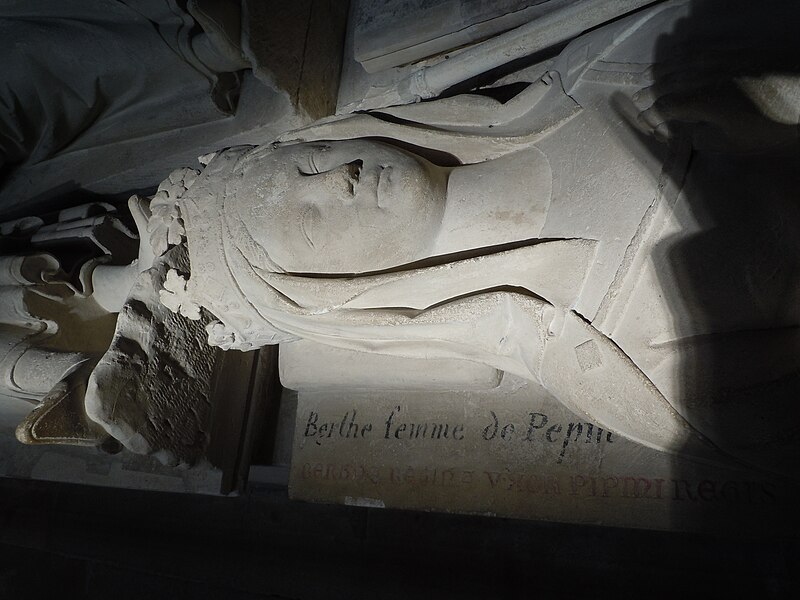 |
| The tomb of Bertrada of Laon |
Charles’ Family
On 30th
April 783 Hildegard died[i]
at Thionville in the same year that her daughter
Hildegarde died. Bertrada of Laon died in the summer and Charles buried his
mother next to his father in the basilica of St Denis.
‘Bertrada died after the
death of Hildigard, having lived to see three grandsons and as many
granddaughters in her son’s house. Charles had his mother buried with great
honour in the same great church of St Denys in which his father lay.’[ii]
Charles
married his third wife Fastrada in 784 and she had a daughter Theodrada[iii]; her second child was Hiltrude born
in 787.
Despite
close chaperonage Charles’ daughter Rotrude had an affair with Rorgon[iv], and in 800 had a son named Louis. There was talk that Bertrada might
be married off to King Offa of Mercia. Instead she had a long and
passionate affair with one of her father’s closest friends, Angilbert[v], a courtier, warrior, poet, scholar
and religious leader. There is dispute over whether the couple were married,
but they had two sons, one of them Nithard, born in 795, became a historian. Once Angilbert, when he was away on
official business, wrote a poem he sent to Bertrada, referring to the couple’s
children;
 |
| Charles with his son Louis |
‘Tell the boys, poem of
mine, to keep safe by God’s mercy within their walls from fire and thief and
sickness.’[vi]
Charles did
not approve marriages for any of his daughters[vii];
instead they were placed into positions of power within the church as Abbesses. Their illegitimate children were provided for in the same way.
In 781
Charles had his son Carloman (whom he had renamed Pepin) anointed "king of
Italy" and crowned by Hadrian with the Iron Crown of Lombardy. Pepin’s
younger brother Charles was anointed king of Aquitaine. Charles’ youngest son Louis,
who was only 3-years old, was appointed sub-king of Italy and Aquitaine.
Educating Francia
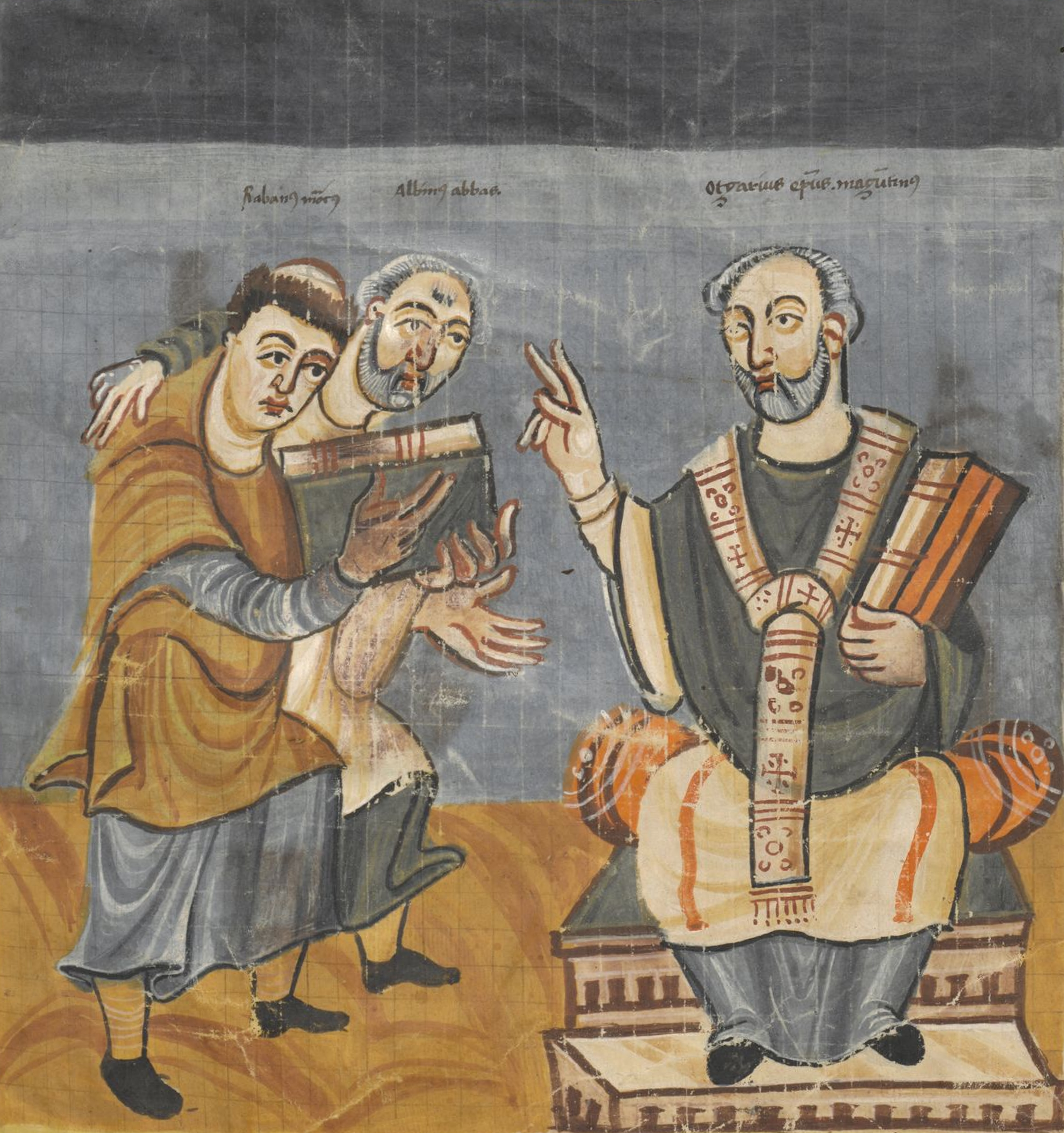 |
| Alcuin of Northumberland |
From the
very beginning of his reign Charles had plans for role of education in Francia.
The French politician and historian François Guizot[viii] said of Charles;
‘His predominating idea was
the design of civilising his people.’[ix]
Charles had
grown up in his father’s sophisticated court where he met many of the premier
prelates of the day.
Charles and
his advisers were concerned to rule Francia in accordance with God’s will. And
for that the clergy needed educating. A series of Capitularies decreed the
restoration of strict canon law in the church, conformity of rule in
monasteries and correct Christian
living throughout the kingdom.
In 782
Charles invited Alcuin of Northumbria[x] to join his court. Charles’ sister
Gisela was an active supporter of Alcuin’s work. Alcuin was to play an important
role in Charles’ cultural and religious ambitions. He ran the palace school for
14 years, where the sons of kings and princes and the nobility came to be
instructed in the trivium
and the quadrivium[xi]. To provide the school with texts
Charles had agents scouring libraries for interesting manuscripts which were
copied in his ever busy scriptoriums.
Charles was
fascinated by astrology almost as much as he was by the bible and the heads of
the early church. According to Einhard;
‘[Charles] paid the greatest
attention to the liberal arts….For his lessons in grammar he listened to the
instruction of Deacon Peter of Pisa, an
old man; but for all other subjects Albinus, called Alcuin, also a deacon, was
his teacher…. the most learned man of his time. Charles spent much time and
labour in learning rhetoric and dialectic, and especially astronomy, from
Alcuin.’
Peter of
Pisa not only taught Charles grammar, he also taught him Latin, the language of
the church. Charles efforts to improve his reading and writing came to naught,
despite keeping notebooks under his pillow to enable him to work in snatched
moments of free time.
Bavarians
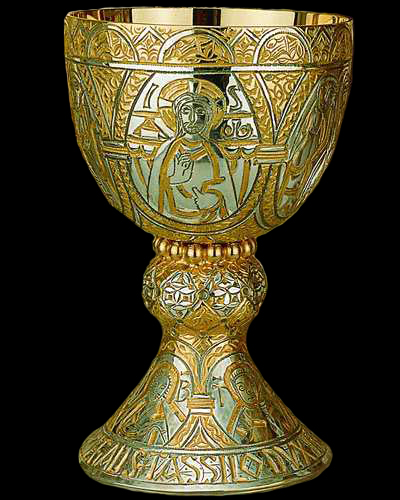 |
| The Tassilo Cup |
Duke Tassilo of Bavaria, a cousin of Charles and son-in-law
of Desiderius, asserted his independence of the Franks. Both Pepin the Short
and Charles took the view that Bavaria was a vassal state. Tassilo occasionally
provided troops for Charles’ armies, but occasionally declined to attend the
annual gatherings of Frankish nobles. In 781 Hadrian told Tassilo to;
‘Remember his former oaths
and not to go back on his long-standing pledge to the Lord King Pepin, the
great Lord King Charles and the Franks.’[xii]
Hadrian’s
poking his nose into this squabble probably resulted from Tassilo’s
interference in church affairs in Bavaria, deeply resented by the bishops
there. In a separate decision, that doomed Tassilo, Charles decided that he
needed direct control over the eastern Alpine passes and the Danube valley[xiii].
Hadrian
assisted Charles in putting pressure on Tassilo and when Tassilo sent envoys to
Rome in 787, he pronounced an anathema on Tassilo. Charles ordered Tassilo
to present himself at Worms and ratify an oath of loyalty, a journey Tassilo
was reluctant to undertake.
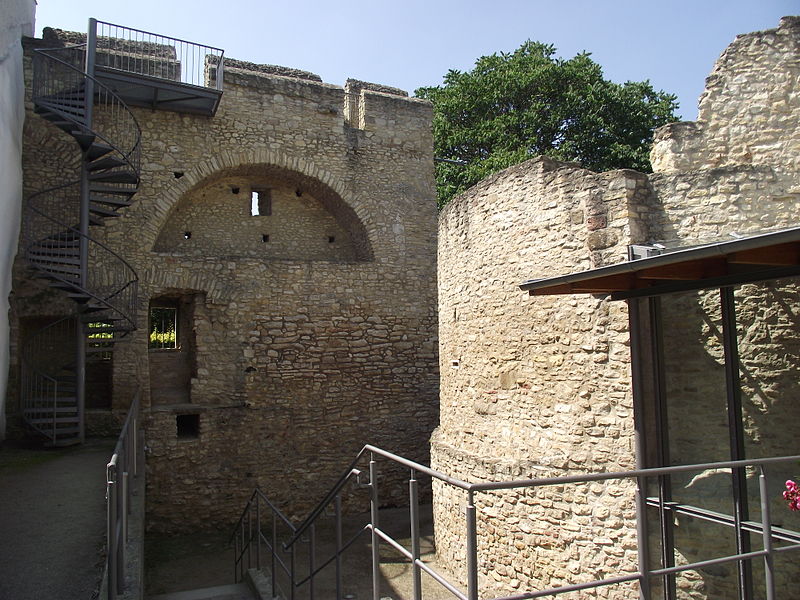 |
| Charles' villa at Engelheim |
Charles
reacted by sending three armies into Bavaria; he led the army that crossed the
Danube near Regensburg. Another army under Pepin’s titular
leadership crossed the Alps from Italy. Tassilo had no choice but to surrender
his lands to Charles. He was allowed to yield up his dukedom, but within months
was charged with plotting rebellion with the Avars in the lands bordering Bavaria.
Tassilo, his
family, treasure and household were taken to Charles’ villa at Engelheim and there was tried and convicted after he confessed. Tassilo and his sons were
forcibly tonsured and sent to separate monasteries, while his wife was exiled.
For his part Hadrian’s problems in Italy were lessened
when, on 26th August 787, Arechis II, Duke of
Benevento, died. His son Grimoald III, was a hostage
of the Franks. In 788 Charles’ son Charles the Younger made Grimoald a client
of the Frankish kingdom.
And Barbarians
| Abrodites' territory |
In 789
Charlemagne marched an Austrasian-Saxon army across the Elbe into Abodrite territory. The Slavs ultimately
submitted, led by their leader Witzin. Charles accepted the surrender of
the Wiltzes under Dragovit demanding hostages. Charlemagne insisted on the right to send missionaries
into the area and that they not be molested. The army marched to the Baltic before turning around and marching
to the Rhine. The army returned home with a large amount of booty that had been
easily won. The tributary Slavs became loyal allies.
Following
the campaigns in the north Charles turned his attention to the Avars, a tribe
centred in the Lower Danube basin. By early 7th century they
dominated the area[xiv].
Their dominancy was threatened by the Bulgars who forced the Avars westwards towards Bavaria[xv].
In 791 the Avars raided into Bavaria and when they were repulsed offered
hostages and conversions.
Charles
decided to personally see off the Avar attack. At the head of a large army,
before crossing into enemy territory, Charles ordered three days of prayer and
fasting to ensure divine aid. The opposition crumbled; allowing the Franks to
strike deep into Avar territory. The Avars had been weakened by the Bulgars and
internal strife.
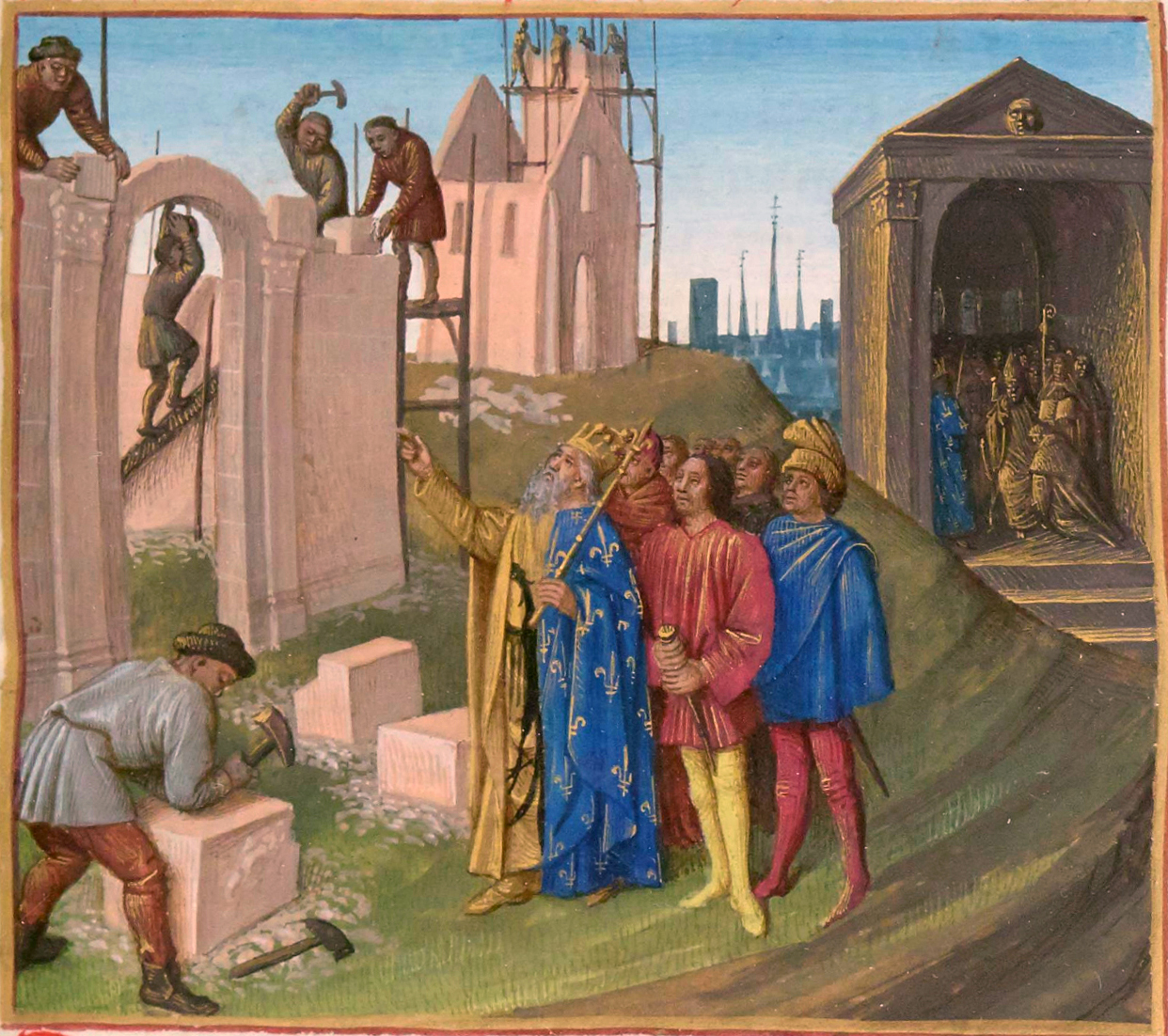 |
| Charles inspecting the work on his palace at Aachen |
The Royal
Frankish Annals record that;
‘[Duke Erik]
dispatched his men under the command of the Slav Wonomir into
Pannonia and
had them plunder the ring[xvi]
of the Avars…..the duke sent the treasure of the ancient kings[xvii]….to
the Lord King Charles at the palace at Aachen.’[xviii]
Charles
donated part of the haul to the pope and gave rewards to his counts and dukes. But
much of his prize was devoted to building himself a new capital city at Aachen[xix].
The architect whose job it was to create Charles’ vision was Odo of Metz, responsible for the palace Charles built there.
The
expeditions against the Avars secured Charles’ eastern borders, although he
made no effort to include the Avar territory in his kingdom. The marches of the
Danube provided a buffer zone between Francia and the Balkans with whose tangled affairs Charles had no desire to involve himself in.
Bibliography
Celts and Saxons – Peter Berrisford Ellis, Constable and Company Ltd
1995
The Cambridge Illustrated History of the Middle Ages – Robert Fossier
(ed), Cambridge University Press 1989
The Holy Roman Empire – Friedrich Heer, Phoenix 1999
The Oxford History of Medieval Europe – George Holmes, Oxford University
Press 2001The Year 1000 – Robert Lacey & Danny Danziger, Abacus 2007
Absolute Monarchs – John Julius Norwich, Random House 2011
Emperor of the West – Hywel Williams, Quercus 2010
Charlemagne – The Great Adventure – Derek Wilson, Hutchinson 2005
www.gutenberg.org
www.wikipedia.en
[i]
Possibly worn out by birthing nine children
[iv]
Later the Count of Maine
[v]
Made a saint
[vi]
Charlemagne - Wilson
[vii]
It has been postulated that Charles was concerned about setting up potential
rivals
[ix]
Charlemagne - Wilson
[xi]
Together these made up the seven liberal arts
[xii]
Charlemagne - Wilson
[xiv]
In 626 they even threatened Constantinople and only their lack of sophisticated
siege weapons halted their attack
[xv]
In turn the Bulgars were being ousted by the Byzantines who were reasserting
control over former possessions.
[xvii]
So much treasure was held in the ring that Charles sent a second expedition
under Pepin to retrieve the remainder
[xviii]
Charlemagne - Wilson
[xix]
Popular with the Romans for it’s hot springs
I note that you mention that Charles was fascinated by Astrology but that Einhard says that he studied Astronomy. I know that the two were much the same then, but Astronomy implies an interest in the heavenly bodies for their own sake, or to use for navigation, where astrology implies fortune telling and so on. This is an interesting dichotomy in his character if so, since the only time the readers of stars and portents were mentioned in a positive light were the Magi who came to Bethlehem to worship the King whose star had arisen. Other astrologers in apocrypha[which hadn't all been separated off at this date] and in the Bible, such as Simon the Wizard,[Acts? I think] were shown to be frauds. I'm not sure I'm drawing any conclusions here, just fishing in the dark around an interesting paradox.
ReplyDelete